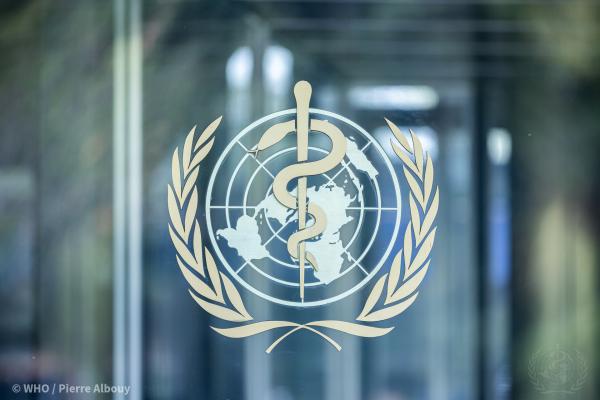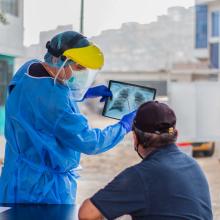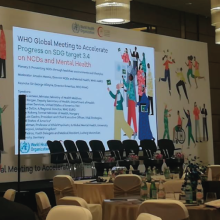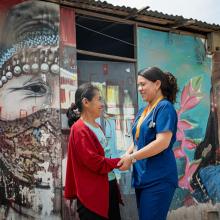For nearly 40 years, Partners In Health (PIH) has worked alongside the World Health Organization (WHO) to improve health outcomes in the 11 countries where PIH operates, including Peru, where it is known as Socios En Salud (SES).
From its critical support in responding to epidemic outbreaks, such as the recent Marburg outbreak in Rwanda, to its ongoing collaboration in treating chronic diseases in children, the partnership between WHO, PIH and national governments has been indispensable in strengthening health systems.
For this work to continue and the right to health to advance, the United States must remain at WHO. As such, PIH strongly rejects the decision by President Donald Trump’s administration to withdraw his country from the organization.
Below, learn more about WHO, what the U.S. withdrawal means for PIH and global health, as well as the impact of the 90-day pause on foreign aid and more.
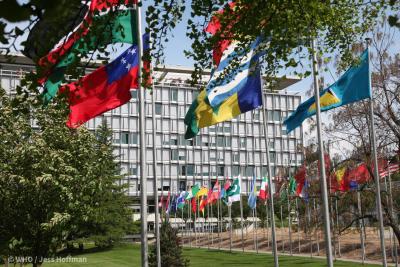
La Organización Mundial de la Salud (OMS) está conformada por 194 estados miembros 2 miembros asociados, que se reúnen anualmente en Ginebra (Suiza) en el marco de la Asamblea Mundial de la Salud.
Foto de Jess Hoffman / OMS
What is the World Health Organization (WHO)?
WHO is a specialized agency of the United Nations and a pillar of global health, acting as a vital force for saving lives and promoting equity in health worldwide. Established in 1948, WHO has played a pivotal role in fighting infectious diseases, coordinating responses to global health emergencies and supporting underserved communities.
How is WHO funded?
WHO receives funding from member states, such as the United States, which pay assessed contributions based on a country’s wealth and population; and from voluntary contributions from member states and other partners, such as philanthropic foundations and the private sector. WHO operates on an annual budget of approximately $2.1 billion, and the United States has historically provided about 15% of this funding.
What will the United States lose by leaving WHO?
If the United States leaves WHO, it means:
- Losing a seat at the global decision-making table on which strains of influenza and COVID-19 should be used for annual vaccines.
- Late access to invaluable global data on circulating viruses.
- Failure to participate in discussions on plans to address emerging public health threats.
How will U.S. withdrawal from WHO affect global health?
U.S. withdrawal from WHO will have catastrophic consequences for global health, especially for underserved and vulnerable communities. The loss of U.S. financial and political support severely weakens WHO’s ability to respond to health crises, jeopardizes global vaccination and disease prevention programs, and disrupts strategic partnerships needed for coordinated international responses.
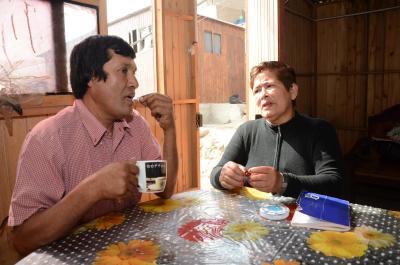
En agosto de 2024, la Organización Mundial de la Salud recomendó tres nuevos regímenes para la tuberculosis multirresistente a fármacos o a la rifampicina (TB-MDR/RR) que fueron estudiados en el ensayo clínico endTB.
Foto de SES
How will the U.S. withdrawal from WHO affect the countries where PIH works?
If the United States withdraws from WHO, the potential impacts on PIH-supported countries, including Peru, include:
- Limitation of invaluable resources for the development of clinical protocols for diseases that affect patients globally, such as cholera, monkeypox (mpox) and Marburg virus.
Reduction in the flow of critical information on disease outbreaks, transmission patterns, variants, treatment efficacy and more, which would affect the Centers for Disease Control and Prevention in Africa and ultimately the rest of the world, including the U.S. This weakens our collective ability to prepare for and curb the spread of emerging infectious diseases.
- Resource limitation for comprehensive, evidence-based approaches and toolsfor strengthening health systems, such as increasing access to medical oxygen.
Limitations in research and development of essential medical measures, such as diagnostics, treatments and vaccines.
What is the suspension of foreign aid
In addition to the U.S. withdrawal from WHO, the Donald Trump administration announced a concurrent 90-day pause in foreign aid. PIH strongly condemns this pause as a harmful decision with devastating implications for global health, international development, and the well-being of vulnerable people around the world.
How will the 90-day pause in foreign aid affect PIH’s funding?
PIH is working to quickly understand the full scope of the impact this order will have on our work and our partners. The abrupt suspension of funding disrupts essential supply chains, weakens health systems, and forces organizations like PIH to fill more gaps and take on a greater burden, which now falls on local ministries of health, already operating with limited resources. The ripple effects of this pause are significant, threatening to destabilize decades of global health advances and leaving critical initiatives unfunded and vulnerable.
PIH urges the Trump administration to reverse the U.S. withdrawal from WHO and the 90-day suspension in foreign aid. Failure to do so will have catastrophic consequences for global health.
If you would like to receive more information on our activities, subscribe here. Join our health movement!
.
